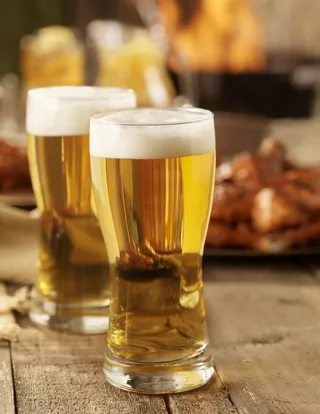Underage Drinking by the Numbers
A look at statistics of teenage drinking.

1 / 14
Teenage Drinking: A Public Health Issue - December is National Drunk and Drugged Driving Prevention Month and underage drinking continues to be dangerous public health problem plaguing our nation. One in 10 teens in high school drinks and drives. A privileged Texas teen Ethan Couch was recently given 10 years of probation for killing four people and injuring another while he was drunk driving. Take a look at teenage drinking and driving facts. — Dominique Zonyéé(Photo by: BSIP/UIG via Getty Images)

2 / 14
An Overview - Although underage drinking among teens is down 54 percent, teenage drinking and driving is still a major issue in most states. By age 15, more than 50 percent of teens have had at least one drink and by the age of 18, 70 percent of teens have had a drink. Overall, teen alcohol use kills about 4,700 people each year, more than all illegal drugs combined.(Photo: Getty Images)

3 / 14
The Difference Between a Drink and Binge Drinking - A drink is usually 14 grams of alcohol, which can be found in a 12-ounce can of beer or 5 ounces of wine. While some teens may have one drink, many partake in binge drinking, which is consuming many drinks (more than 5) on one occasion.(Photo: Lauri Patterson/Getty Images)
Photo By Photo: Lauri Patterson/Getty Images

4 / 14
The Dangers of Binge Drinking - It typically takes one hour for the human body to metabolize one drink. With binge drinking, people are consuming multiple drinks per hour, which can catch up with them later.(Photo: David Young-Wolff/Getty Images)

5 / 14
At What Age Do Most Teens Start Experimenting With Alcohol? - The average age at which young people ages 12 to 17 begin to drink is 13 years old. In a national study, 13.8 percent of eighth-graders reported having at least one drink in the past 30 days, and 11.5 percent had been drunk at least once in the past year.(Photo: Bob Thomas/Getty Images)
ADVERTISEMENT

6 / 14
Why Are Teens Drinking? - Teens drink for a variety of reasons, but peer pressure is one of the most widespread reasons. Parents should have open dialogue with their children about the dangers of underage drinking and how to stand up to peer pressure.

7 / 14
Drinking Before The Age Limit Could Lead To… - Teens who start drinking before 15 years old are five times more likely to develop alcohol dependence or abuse later in life than those who begin drinking at or after the legal age of 21. Additionally, young people who drink are more likely to be the victims of violent crime, to be involved in alcohol-related traffic accidents and to have depression and anxiety, in addition to becoming addicted to alcohol. (Photo: Lucas Jackson /Landov/Reuters)

8 / 14
Alcohol and the Adolescent Brain - “The pre-frontal cortex of the adolescent brain doesn't mature until the early 20s, and that portion of the brain is responsible for judgment,” Ruth Bowles, executive director of the substance abuse prevention provider at the Rockland Council on Alcoholism and Other Drug Dependence, Inc. (RCADD), told BET.com. “Alcohol affects a person’s judgment and coupled with a teenage brain can potentially lead to disaster for adolescents.”(Photo: BSIP/UIG Via Getty Images)

9 / 14
How Are Teens Getting Access to Alcohol? - Teens don’t have to go to the liquor store to get their alcohol. Most teens are getting their alcohol from their parents' at-home bars. According to a study by Columbia University, underage drinkers account for 11.4 percent of all of the alcohol consumed in the U.S.(Photo: Stephen Hird/Reuters)

10 / 14
Once They Drink, How Many Teens Are Getting Behind the Wheel? - “There is no such thing as a drinking and driving accident, people make a conscious effort to get behind the wheel,” Bowles said. A 2011 Youth Risk Behavior Survey found that among high school students, during the past 30 days 8 percent drove after drinking alcohol and 24 rode in car with a driver who had been drinking alcohol.
ADVERTISEMENT

11 / 14
The Annual Death Toll as a Result of Underage Drinking - 1,900 deaths from motor vehicle crashes1,600 from homicides1,200 from alcohol poisoning, falls, burns and drowning300 from suicides(Photo: Ben Noey Jr./The Fort Worth Star-Telegram/AP Photo)

12 / 14
The Consequences Outweigh Underage Drinking - Although Ethan Couch was only given probation for killing four people when he was driving drunk, 9 out of 10 American teens report that drinking is not worth the consequences it can cause. Consequences of underage drinking and driving can vary from Couch’s probation, to loss of driving privileges, costly lawyer fees, or worse, losing your life and/or killing others.(Photo: David McNew/Getty Images)

13 / 14
What Can Parents Do to Help Stop Underage Drinking? - Parents, grandparents, guardians and even friends play a major role in underage drinking prevention. “This case (Ethan Couch) is a perfect example of how parents could open dialogue about the dangers of underage drinking and driving,” Ruth Bowles said.(Photo: Jack Louth/Getty Images)
